Do you feel like your life is being ruled by negative factors? Are you tired of feeling down and unhappy? Are you looking to improve your life? Then you’ll probably be interested in these actionable tips on cutting down the negative aspects of your life!
Here are some things to let go of to be happy that will be discussed in this article: judgment, a victim mentality, toxic people, perfection, gossip, materialism, grudges, and excuses, etc.
Why do you need this? Well, we are responsible for our own happiness, and nobody but we can work towards changing that. That’s why you need to know what you can do to improve your current situation! This article focuses on simple – yet powerful – things that you can let go of right away in order to become happier. So let’s not waste any more time, and get straight to it!
Contents
- Let go of judgment
- Let go of materialism
- Let go of being a victim
- Let go of perfection
- Let go of the idea that life must be fair
- Let go of toxic people
- Let go of the need to please everyone
- Let go of fantasizing about the future
- Let go of the need to be right
- Let go of grudges
- (Bonus) Let go of gossip
- (Bonus) Let go of identifying with your negative thoughts
- (Bonus) Let go of the past
- (Bonus) Let go of excuses
- (Bonus) Let go of the perfect partner
- (Bonus) Let go of your fear of growing old
- (Bonus) Let go of compulsive eating
Let go of judgment
The Brazilian novelist Paulo Coelho wrote about a woman who always complained about her neighbor’s hung laundry because it wasn’t properly cleaned. Here’s the piece:
A young couple moves into a new neighborhood. The next morning while they are eating breakfast, the young woman sees her neighbor hanging the wash outside.
“That laundry is not very clean; she doesn’t know how to wash correctly. Perhaps she needs better laundry soap.” Her husband looks on, remaining silent. Every time her neighbor hangs her wash to dry, the young woman makes the same comments. A month later, the woman is surprised to see a nice clean wash on the line and says to her husband: “Look, she’s finally learned how to wash correctly. I wonder who taught her this?” The husband replies, “I got up early this morning and cleaned our windows.”
This story contains a very important lesson that a lot of people don’t realize.
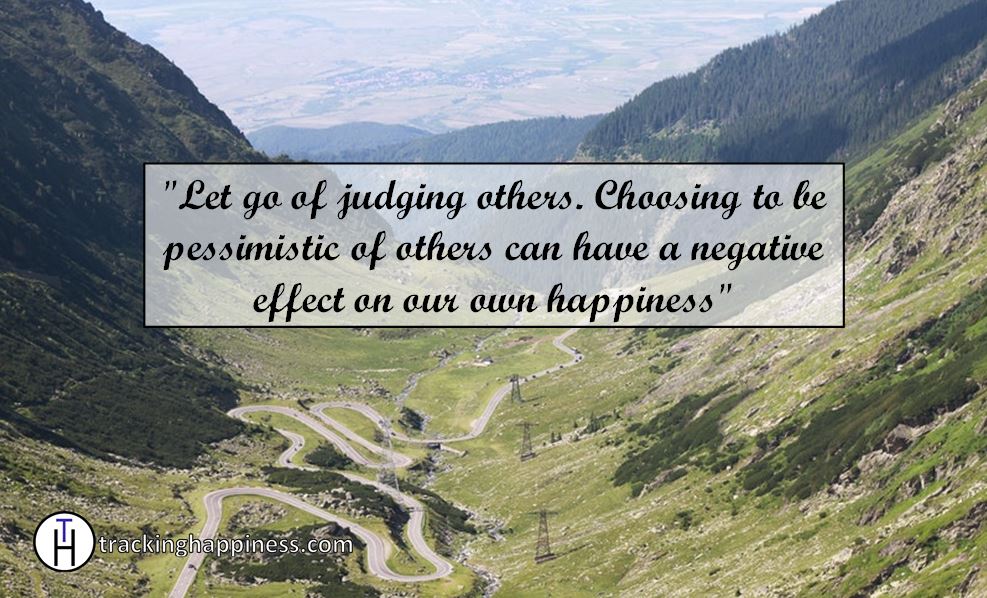
When we are intolerant of others, it’s often because of the filters we use for perceiving them.
Things like prejudices can affect how we see them. When we don’t put ourselves in others’ shoes, it can result in judging them. That, in turn, can prevent us from being happy.
The woman in this story decided to focus on judging others before judging herself. This happens all the time.
When we’re judgmental, it shows we lack self-acceptance since we’re often in a battle with ourselves. Instead of dealing with our own pain, we choose to be judgmental of others instead to feel better.
It’s worth noting that it’s somewhat normal for the mind to think like this. It makes sense: why try to blame ourselves when we can try to blame others first?
However, it’s all about your choice to see the positive in something rather than the negative. Choosing to be pessimistic of others can have a negative effect on our own happiness.
If you want to be happy, then try to catch your judgmental thoughts before you have them. If possible, try to change the thoughts to positive ones. This, in turn, can improve how you perceive yourself.
In fact, if you start feeling judgmental about someone, you can try to tweak those thoughts into curiosity. For example, instead of having angry feelings towards a person, try to become curious about their motives!
Let go of materialism
We’ve all heard sayings like “Money can’t buy you happiness”, but in today’s world of bling-bling and “keeping up with the Joneses”, it’s very easy to become materialistic. That includes trying to define ourselves by what we have instead of who we are.
We often think that getting more money and things will make us happy. It can instead make you unhappy and even depressed.
Here’s why:
People often use those things to try and satisfy themselves. However, they’re actually used as substitutes for things that they think can fulfill their needs. The problem is, those things will never be able to replace inner peace, human connection, and loving attention.
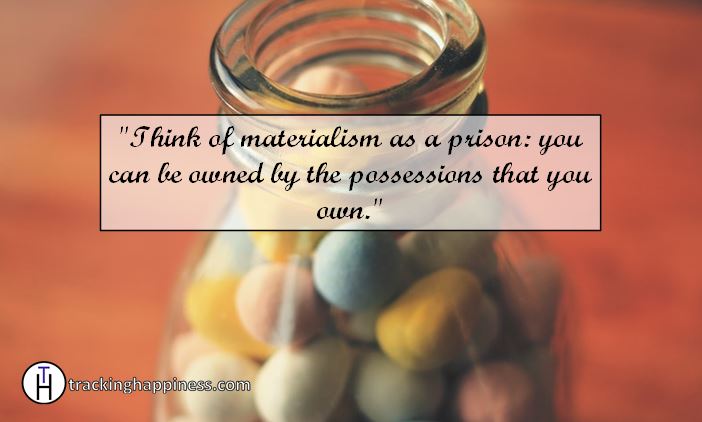
Think of materialism as a prison. It’s one that most people don’t escape from because they don’t realize what it is. It’s difficult to free yourself from something you don’t realize is holding you down.
These tips can help free you from materialism:
- You can be owned by what you own
Possessions can be helpful, but it changes when we’re “owned” by them. This is why the concept of minimalism has been growing lately. In a world that’s focused on consuming, it can be freeing to not think about the latest products and gadgets for once.
- Sharing experiences and happiness
Sharing happiness and experiences with people who are important to you can boost your wellbeing. This happiness usually doesn’t even require any products. It’s often the simple things in life that make us the happiest!
- You need less than you think
The only things you absolutely “need” are the basics like food, clothes, and shelter. No one “needs” the latest iPhone, Smart TV or shoes, and thinking so will only have a negative effect on your happiness. My advice to you? Find out what expenses really have a positive effect on your happiness! It’s what I found out in my happiness essay about the effect of money on happiness.
If you’re still not sure about letting go of materialism, here’s an article I wrote about actual examples of materialism and how you can deal with it!
Let go of being a victim
We need to let go of embracing a victim mindset. This can involve complaining about things that happened to you or feeling sorry for yourself.
What’s the problem? When you blame someone for your situation or complain about it, you’re implying you’re a victim. The problem is you give someone else the control. A better approach is to take full responsibility for your life yourself. Don’t try to shove this responsibility to someone else.
Bad things happen in life like. That’s a fact.
When these situations happen, what matters most is how you react to these challenges. You can either accept the situation and learn from it, or you can play the victim and complain about the situation.
So what steps should you take? Rather than feeling sorry for yourself, focus on the steps you should take to improve the situation. It’s all about your actions instead of your reactions.
So the big question is: what does all of this have to do with being happy?
It’s simple. People who play victim can’t be happy. That’s because they think they deserve a better situation than they have, and only somebody else can fix it for them.
How can you free yourself from victim mentality? Figure out what’s causing you to feel like a victim. The first step is to recognize the thoughts that go on in your head whenever you feel victimized. You can then intervene with these thoughts, and focus on being thankful, forgiving, and positive instead.
Let go of perfection
Is there anything wrong with improving yourself? No, but keep in mind perfection is something you can’t always achieve.
In fact, it can even keep you from living a happy life.
The irony is being a perfectionist can actually prevent you from taking risks and living life to the fullest. A better approach is to take life one step at a time.
It starts with realizing perfectionism is a problem. There’s nothing wrong with setting goals and having high standards. However, it can be unhealthy to be a perfectionist since you’ll always feel you’re not good enough. This might even stop you from trying something at all!
Accept that you’ll make mistakes along the way, but also recognize that moving forward is more important than being flawless. Giving 100% and trying your hardest is the best you can do in terms of reaching your full potential.
You can also focus on your uniqueness. We often perceive flaws as something negative. However, they can actually be our top asset, our unique selling points. It’s a matter of finding something positive in something that bothers you.
A lot of people in the world have become successful by celebrating things that made them different.
You should never be afraid to make mistakes. Everybody fails. That includes you.
It’s important to embrace these mistakes and to learn from them, rather than have these mistakes keep you from trying something at all!
Let go of the idea that life must be fair
We often have the belief that life must be fair. I mean, we all believe in some form of Karma, right?
That might be the case in a perfect world, but it’s unfortunately not how things work on our planet. Sometimes good people die young. Some people don’t appreciate acts of kindness. Some horrible people get away with doing terrible things. These things happen on a daily basis, and it’s not fair.
We must accept that, rather than be upset about it.
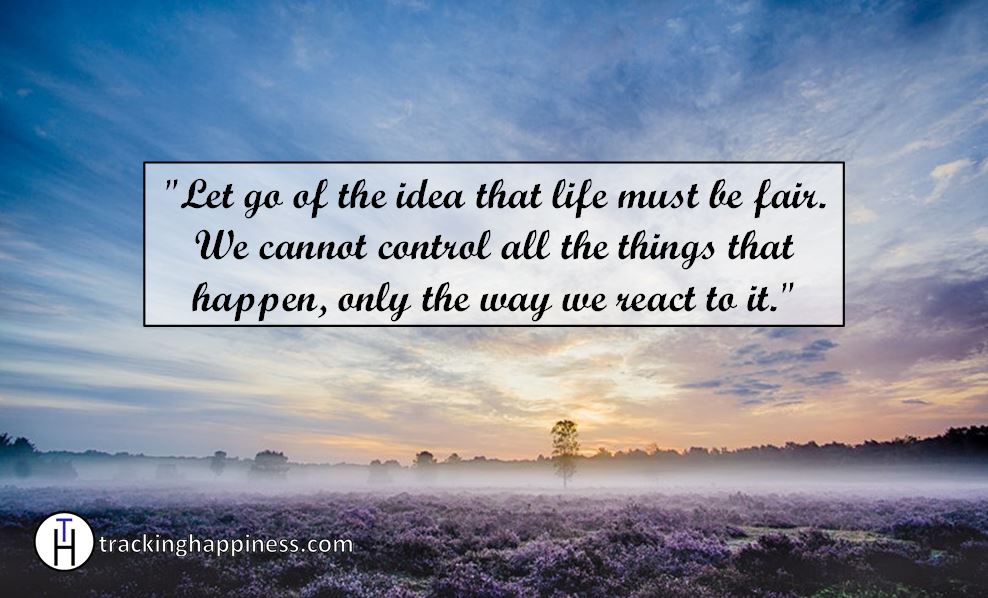
The concept of fairness is a rather interesting one. There are people out there that feel like they deserve more than others, based on the good deeds that they’ve done or the amount of hard work provided. These people might feel like they are a victim of an unfair world.
While these people may seem justified to you, there’s also a problem with the mindset of these people.
You see, when they say “life is unfair”, what you could be hearing otherwise is “I feel entitled”.
People who say the world is unfair are sometimes only saying that because they feel they have been mistreated or unrewarded. They feel entitled and think they deserve good things, only because somewhere else somebody is seemingly getting better treatment while not doing as much good.
What does this feeling of entitlement result in?
That’s right: a feeling of resentment, unhappiness, and hate.
So even though it might be true that the world is not a fair place, it’s never good for you to dwell on this unfairness for too long.
We cannot control all the things that happen to us (or to anyone for that matter).
What we CAN control is how we react to these things. We can decide to feel mistreated over something that happens, but if we hold on to that feeling for too long, we’re only going to sell ourselves short.
My advice to you? Accept that the world is unfair at times, and focus on something positive instead!
Even better? Focus on having a positive influence on the life of the people that are close to you! This will directly make the world a better place.
Let go of toxic people
If you surround yourself with toxic people, you’ll be less likely to live a happy and fulfilling life. That’s a simple fact.
What’s the problem with being around people who are manipulators and complainers? One of the main problems is that they don’t realize how contagious their toxicity is. They’re a buzz kill and don’t seem to mind that they suck the happiness and energy out of everyone around them.
In fact, we often forget to think about who exactly are the toxic people around us. Take some time thinking about the people you spend most of your time with. There are some important things to keep in mind. Who do you think of when thinking about negative energy, complaining, pessimism and gossiping?
Now reconsider this: are these people actually having a positive influence on your life?
No? Then you should try to let go of these people.
Toxic people might change, but don’t expect them to. They use and manipulate people in complex ways and aren’t motivated by their relationship or even what’s best for them.
When dealing with toxic people, it’s important to deal with them as effectively as possible. Make sure you establish and maintain relationship boundaries. Make it crystal clear with toxic friends, relatives, co-workers, and neighbors what you will and won’t tolerate from them.
Also, keep in mind toxic people create a “crisis” and drama in order to get attention and to manipulate others. Toxic people also prey on other person’s problems and weaknesses, in order to elevate their own happiness.
The bottom line is: dealing with anything toxic rarely ever works out well.
Let go of the need to please everyone
It’s natural for most of us to want people to like us.
However, if we spend most of our time, effort, and money trying to please other people, it can prevent us from living a happy life ourselves. This has a lot to do with our perception of what makes people happy.
We often think that if other people are pleased, then they’ll be happy. That’s not really the case. People are happy because they make a conscious decision to feel that way. In other words, it should be an internal process not based on external factors.
So what happens when we try to be happy by pleasing other people? We might feel good about it, but it will unlikely result in true happiness.
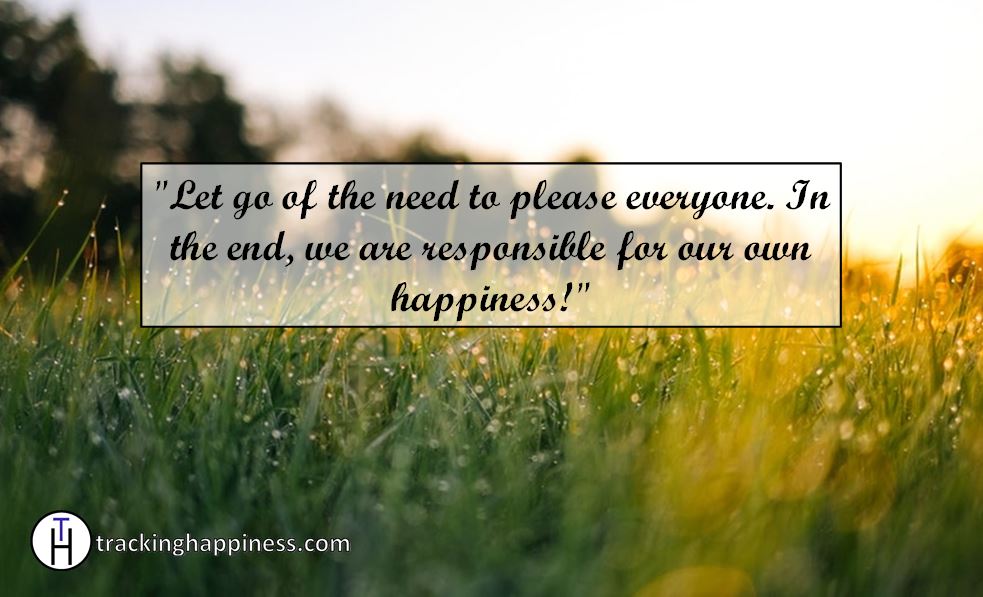
One key reason is it can be tough to keep everyone happy. That’s because people have different needs. So what makes one person happy might make another person unhappy. When we focus on others’ needs and neglect our own, it can also become exhausting and stressful.
In the end, we are responsible for our own happiness, not somebody else. Pleasing others should not be prioritized over your own happiness!
This doesn’t mean we shouldn’t care about other people or try to get along with them. Making others smile or helping others with a random act of kindness is fantastic, and can have great effects on your happiness. But feeling the constant need to please others can backfire.
You need to let go of that need to please others. Take care of yourself first!
Let go of fantasizing about the future
This might seem like an enigmatic way to achieve happiness. How can we ditch something that hasn’t happened? Many people worry about the future. That’s obviously not going to achieve happiness because you’re focusing on the negative things that might or might not happen later.
The problem with having an attachment to the future is it doesn’t always result in happiness. Let’s say you fantasize about what could happen in the future. This results in “fake” happiness that only lasts during the moment. So when you return to the present, you typically won’t feel keep up this happy feeling.
In fact, consider that most people fantasize about the future because they don’t want to deal with the present. This doesn’t mean you shouldn’t think about the future. It also doesn’t mean you shouldn’t have future goals.
That said, it can become a problem when you keep comparing the future with your current situation. This is especially true if you’re unsuccessful at achieving your goals.
If you want to achieve happiness, stop fantasizing about the future and start building it. This involves living in the moment and taking steps to give yourself a better future. Another good approach is to focus on what you can do today.
How can you avoid fantasizing about the future? Make sure to avoid doing mindless tasks and instead focus on being productive. If your mind starts wandering, redirect it to the task at hand.
Try not to let your mind wander too often, and start living in the moment more!
Let go of the need to be right
We all know someone who thinks they’re always right regardless of the situation. The problem is they don’t consider that other people have different values, beliefs, priorities, etc. The simple fact is that it’s usually not just a matter of being right or wrong. It’s usually a matter of perspective. So when you say your way is right, you might imply that your perception is different.
In “How to Win Friends and Influence People”, Dale Carnegie points out that it’s human nature for people to believe they’re right. That’s even true when there’s strong evidence that’s not the case.
In addition, one main reason people have different opinions is based on the amount of different info they have about something. For example, people might make assumptions about your personality without knowing you well, based on a single interaction. It’s very hard to not assume that we’re right unless we’re proven wrong without doubt.
And that’s sometimes dangerous.
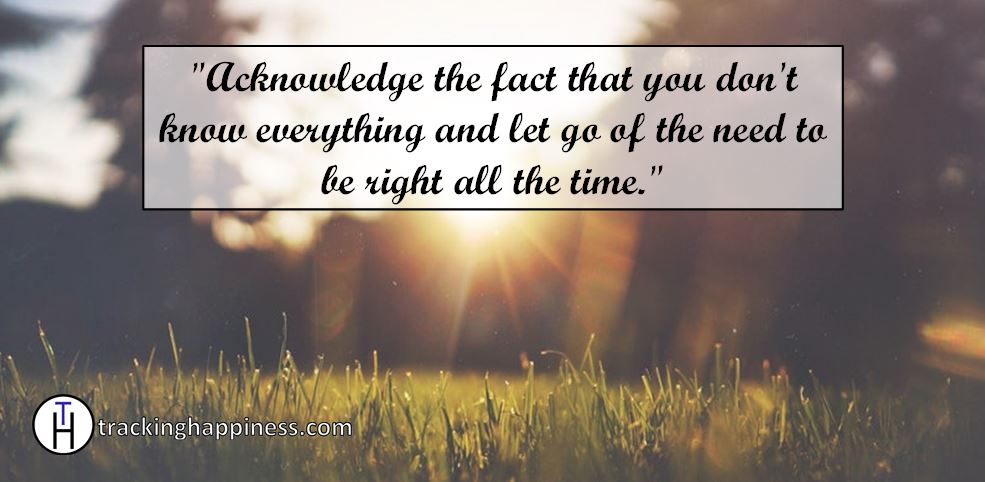
So having the belief that you’re right 100% of the time is pointless. That’s because it will cause arguments and conflicts when people see things differently from you.
There’s the old saying that there are two sides to every argument. If you want to convince people to see things from your perspective, then it’s important to do the same for them. This is easier said than done.
However, just being aware of this issue can already be a huge step in the right direction. By simply saying “I don’t know” more often, you’re acknowledging the fact that you don’t know everything. And that is something that will make you happier.
Paradoxically, this will only increase your level of knowledge. Knowing when to say “I don’t know” is a skill that’s becoming more and more valuable in today’s volatile world.
Let go of grudges
We all have had bad things done to us. Do we have to accept any or all of them? The answer is: no. We don’t HAVE to.
That said, it’s important to take the proverbial step of forgiving and forgetting.
This also doesn’t mean we have to validate or justify what the person did to us. There’s nothing wrong with being unhappy about what someone did. However, what’s important is to release the negative energy you take with you.
It’s still possible to live a happy life even if you were harmed by other people. The key here is to choose to be happy because you have the power to let go of the situation and move on with your life.

What are some ways to get rid of grudges? One of the biggest steps is first to discover and admit what’s causing the grudge. This is the critical first step.
You can also share your feelings with the person you feel a grudge towards. Be sure to make it clear how you feel about the particular situation. Only contact the person when you’re ready to share your feelings though. You should not share your feelings only because you want an apology or some form of justice. And reach out to them as a way of letting go of negative energy (by forgiving, for example).
Another step you can take is to try and put yourself in the other person’s shoes. For example, the other person involved might have been dealing with physical or emotional pain. It might help to explain their actions.
Does it justify the harm done towards you? Probably not.
But it might help you get over your grudges. And that helps you become happier.
(Bonus) Let go of gossip
The irony of gossip is while it almost never stimulates happiness, people still often like to do it. Here are some of the main reasons:
- Avoid talking about ourselves
- Jealousy of other people
- Makes people part of a group (collectively talking down on others is fun!)
- Mistakenly portrays people to be popular
- Makes people feel superior
But it’s NEVER a source of long-term happiness. Not for yourself, not for the others, and definitely not for the person you’re gossiping about.
But it’s NEVER a source of long-term happiness. Not for yourself, not for the others, and definitely not for the person you’re gossiping about.
Is there anything wrong with mentioning other people in our conversations? No, but the problem is when the talk becomes a (negative) commentary from you. In this case, your words could be misleading for others. This is more likely when we add to the story, so it sounds more interesting.
Gossiping causes more harm than good. It can create an awkward situation when the person learns about what you’re saying. It can – and should – also cause guilt, especially when it’s a close friend or relative.
It goes back to that old saying: only say “nice” things about others. It’s really that simple. When you feel the urge to talk down/gossip about people, use a filter to consider whether or not you’re saying truly positive things about them. If not, then try to recognize this and stop. Don’t be a part of it.
You can also place yourself in the other person’s shoes. If you can gossip about them, they could gossip about you.
(Bonus) Let go of identifying with your negative thoughts
Ditching negative thoughts, in general, can help lead to happiness. A more specific approach is to not identify with your thoughts.
What do I mean? Make a space between your cognitions and you. Streams of thought don’t end so stop following each of them.
Studies show humans have an average of 70,000 thoughts per day. Some are positive, and some are negative. You should definitely try to get negative thoughts about yourself out of your mind.
What are some of the types of negative thoughts people have about themselves? One of the biggest ones is that we’re not enough.
In other words, our mind tells us we’re not smart, handsome, or talented enough compared to other people. Some of the most common sources of such thoughts are the media or even people we know as friends and family.
The best approach is to let your thoughts come and go. Then just observe them instead of automatically believing them. Choosing not to believe everything your mind says about you can help you be happier and more at peace.
You can take various steps to get rid of these thoughts. You can write down the negative thoughts about yourself on a piece of paper and then literally throw them out. A 2012 study by Ohio State University showed that people who wrote and then tossed negative thoughts about their bodies had a better self-image within a couple of minutes.
Talk about an effective and fun strategy, right?! Learning to think positively is a very big factor in our happiness, as explained in this article about the benefits of a positive mental attitude.
This is also why I’m a big fan of journaling. It allows me to get rid of any feelings, which is especially helpful when my mind is filled with worrying thoughts. I really like this analogy: writing down my thoughts allows me to clear my RAM memory, so I don’t have to worry about it anymore.
(Bonus) Let go of the past
It can be quite tough to forget the past, and especially things like past mistakes. Nobody is perfect, so we’ve all made mistakes in the past whether they’re big or small. Remember that you made the best decision you could, even if it was the wrong one. It’s critical to forgive yourself for past mistakes and move forward with your current life.
Think of your life as a novel. If a story’s main character makes a mistake, it’s important for them (and the story) to move on. This should involve trying to make better decisions in the future, which in turn can make their life better.

Does that mean we should only forget the bad things? There’s nothing wrong with remembering good or bad times, but it’s critical not to dwell on the past if you want to experience true happiness. That includes the good and bad.
How should we think about the past? Just keep it where it is. It’s impossible to change, and in fact, there’s no need to change it. For example, you might have had some bad experiences in the past. They can still benefit you because they helped to make you who you are today.
(Bonus) Let go of excuses
It’s often been said that excuses are like noses because everyone has one. We often procrastinate for various reasons. We might say we don’t have the time, energy, motivation, or discipline to start something.
What’s the big deal?
When we make excuses, we lose opportunities that we can’t get back. These are situations that could, in fact, make our lives better and happier.

The key is to stop making excuses and get the best results. It’s interesting to note that we actually have a wide range of excuses we can make. The problem is it limits what we can achieve.
We often use excuses to rationalize the actions we take related to people, events, and situations. The problem is excuses can prevent you from getting what you want in life and thus being happy. Excuses may lead to short-term happiness, but that’s obviously sustainable.
You need to let go of making these excuses, or else you will not reach your long-term goals which lead to long-term happiness.
The key is to stop making excuses over and over again. Fear, uncertainty, mistakes, failure, and laziness are some of the reasons we make excuses. The key is to ditch them, so you get on track to achieving your life goals.
(Bonus) Let go of the perfect partner
There’s no such thing as a perfect person. I think we can all agree here.
This means that the perfect partner also doesn’t exist. This is something you should definitely remove from your checklist. We tend to have a complete list of features and characteristics in our mind about our perfect partner.
But who is this person?
We think that this perfect person loves us unconditionally, always support us, always agree with us, and basically live a happy-ever-after.

What’s the problem with this approach? The perfect partner doesn’t exist, so if you want to be truly happy, it’s important to let go of your perfectionism.
How? Keep in mind that neither you nor your partner will be perfect. Once you accept that fact it will be easier to find someone who’s right for you.
The key to happy relationships is to find someone who’s a good match with you, despite both your flaws. It’s more important to have an open and honest relationship that accepts the other person for who they are.
And that includes the rough edges.
(Bonus) Let go of your fear of growing old
The signs of aging can be pretty scary. For example, we start to experience things like wrinkles, balding, forgetfulness, etc. We also start dealing with health conditions and diseases that can make our lives tougher and sometimes can’t be cured.
These physical and mental changes can cause people to become depressed. In the US alone, 7 million seniors are depressed. However, it’s interesting to note that depression isn’t a natural part of aging.
In fact, we actually pick up positive things as we age. That includes knowledge, wisdom, empathy, and so on. The more you try to improve in such areas the better person you’ll be and the more you’ll have to offer for it.
It’s all about perspective.
Instead of growing old fearfully, try to grow gracefully. There are various ways you can do that, including taking care of yourself physically. Make sure to eat healthily and avoid heavy alcohol, smoking, and drug abuse. You should also make sure to enjoy comfort foods that are a part of living and enjoying life.
But don’t forget to take care of your mental health. Get enough sleep at night and take a breather from time to time during the day.
(Bonus) Let go of compulsive eating
Are you eating to live or are you living to eat?
This might sound like a silly question, but nearly one-third of the world is now overweight or obese, and it’s becoming a global epidemic.
People overeat for different reasons. One of the most common – yet dangerous – ones is binge eating. This is done as a coping mechanism. What’s important here is that the short-term satisfaction of food is used to deal with bigger issues that have nothing to do with food.
That, in turn, results in obesity which prevents true long-term happiness.
Does this mean food can’t bring happiness? It can and it should. There’s nothing wrong with eating some comfort food from time to time. It’s also more than okay to splurge sometimes and visit an all-you-can-eat buffet.
Hell, I do it myself on a monthly basis!
However, if you have a healthy relationship with food, you can listen to your body and recalibrate it by going back to your regular diet.
Happy people also know how to deal with stress in their lives effectively without requiring addictive things such as binge eating. They’re able to achieve that goal without harming their body with fast food, alcohol, cigarettes, or drugs.
What can you do to avoid using food to cope with problems? Try to find a different coping mechanism that isn’t necessarily bad for you. Find a hobby that allows you to get rid of frustrations. Go for a walk, go boxing or play a video game. But don’t allow binge eating to become a habit.
If you suffer from binge eating, you should know that you can take actionable steps against it. Stop compulsive thoughts before they turn into compulsive actions (i.e. eating)! Find the source of your frustrations, and deal with it there.. Then start using new coping mechanisms to deal with your problems.

